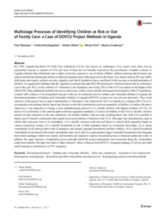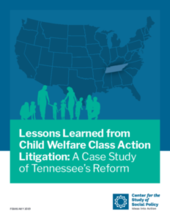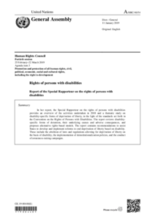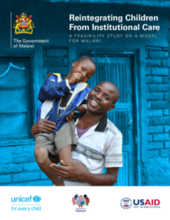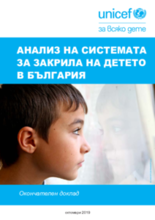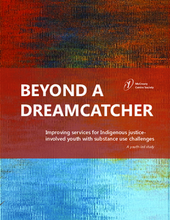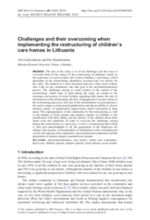Displaying 211 - 220 of 691
This open access paper documents the Deinstitutionalization of Orphans and Vulnerable Children in Uganda (DOVCU) project, articulating the logical steps that were undertaken to identify districts, Child Care Institutions (CCIs), Remand Homes (RH), sub-counties, and parishes to work with. It also seeks to categorically outline the inclusive process that was used to examine push and pull factors of family-child separation, identify households at risk of family-child separation “prevention households,” identify reunifying children and trace their households “reintegrating households,” and assess and classify in quantified terms the level of vulnerability in both at risk and separated households.
This study is based on a review of the documented history of Tennessee’s child welfare reform and informed by the reflections and perspectives of many who played key roles in the litigation and related system improvement efforts.
The Transitioning to Family Care for Children Online Training provides an overview of the key concepts and steps that are important to a successful transition process.
In her report, the Special Rapporteur on the rights of persons with disabilities provides an overview of the activities undertaken in 2018 and a thematic study on disability-specific forms of deprivation of liberty, in the light of the standards set forth in the Convention on the Rights of Persons with Disabilities.
This report presents the Reintegration Model based on the implementation of a Feasibility Study that aimed to determine whether Malawi's Reintegration Framework would be effective in reintegrating children with their families or other forms of alternative family-based care for children.
The aim of the study is to highlight the basic social services provided to children and their families as well as the main reasons for abandonment of children and to propose measures to improve social services for children to ensure social security in the regions.
This research is based on a stock-taking of the current situation. It is based on a comprehensive literature review and a genuine primary research with service users as well as policy makers, service providers, children and families.
The Christian Alliance for Orphans has offered this challenge grant opportunity to spark innovation as child-serving organizations create or expand effective family care solutions for children. The organizations have reported their progress in a series of videos.
This youth-led study sought to capture the perspectives of Indigenous youth who had been involved in the criminal justice system (or who were at high risk of such involvement), and who had accessed substance use treatment and/or had experienced barriers to accessing substance use services.
The aim of the study is to reveal challenges and the ways to overcome them in the context of the restructuring of childcare, based on the experience of social workers who work in children’s care homes in Lithuania, which participate in the restructuring.

